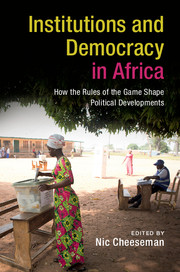Book contents
- Frontmatter
- Dedication
- Contents
- List of Figures
- List of Tables
- List of Contributors
- 1 Introduction: Understanding African Politics: Bringing the State Back In
- Part I Institutional Foundations
- 2 Institutional Legacies: Understanding Multiparty Politics in Historical Perspective
- 3 Property and Land Institutions: Origins, Variations and Political Effects
- 4 Financial Institutions: Economic Liberalisation, Credit and Opposition Party Successes
- Part II Law and Order
- Part III Elections, Parties and Political Competition
- Part IV Countervailing Institutions
- Index
- References
4 - Financial Institutions: Economic Liberalisation, Credit and Opposition Party Successes
from Part I - Institutional Foundations
Published online by Cambridge University Press: 05 February 2018
- Frontmatter
- Dedication
- Contents
- List of Figures
- List of Tables
- List of Contributors
- 1 Introduction: Understanding African Politics: Bringing the State Back In
- Part I Institutional Foundations
- 2 Institutional Legacies: Understanding Multiparty Politics in Historical Perspective
- 3 Property and Land Institutions: Origins, Variations and Political Effects
- 4 Financial Institutions: Economic Liberalisation, Credit and Opposition Party Successes
- Part II Law and Order
- Part III Elections, Parties and Political Competition
- Part IV Countervailing Institutions
- Index
- References
Summary
The paradigm of informal politics has fundamentally shaped the study of political power in sub-Saharan Africa over several decades. Writing in the early 1980s, as many countries were falling into crisis, Robert Jackson and Carl Rosberg argued that African countries were best understood by focusing on the personal rule of their leaders rather than on the functioning of their institutions. African leaders, in their view, were unconstrained by ‘the assured mediation and regulation of effective political institutions’ (Jackson and Rosberg 1982: 12). On the eve of the twenty-first century, Patrick Chabal and Jean-Pascal Daloz (1999: 16), reaffirming this view, contended that institutions across Africa remained ‘a pseudo-Western façade masking the realities of deeply personalised political relations’, despite the political and economic transformations that followed the end of the Cold War. Countless studies have followed these foundational works in repeating their argument without amendment: the formal institutions of African countries, whether described as dysfunctional, incoherent or weak, have little to no impact on politics in the region (for a comprehensive discussion see Chapter 1).
This chapter challenges the conventional wisdom associated with the paradigm of informal politics by focusing on the role of financial institutions in systematically coordinating the political behaviour of African elites. Although the analysis of formal institutions often focuses explicitly on political organisations, such as parties or governmental administrative structures like bureaucracies, I examine the relationship between economic institutions and the political behaviour of entrepreneurs (e.g. businesspeople, merchants and traders). African leaders have long perceived entrepreneurs as a political threat, fearing that their financial capital could be transformed into political influence. My argument is that leaders have sought to contend with this threat by relying on the commercial banking sector – banks are the principal institutions of finance in African countries – to regulate capital accumulation among entrepreneurs and thereby constrain their potential support for regime opponents. I advance two specific claims in this regard.
My first claim is that Africa's first post-independence leaders created financial reprisal regimes to control the business community in their countries. Financial reprisal regimes comprise a set of institutions and regulations – such as maintaining state ownership of banking, channelling credit to privileged sectors and restricting access to foreign exchange – that enables leaders to exercise political discretion in determining who can access capital.
- Type
- Chapter
- Information
- Institutions and Democracy in AfricaHow the Rules of the Game Shape Political Developments, pp. 92 - 114Publisher: Cambridge University PressPrint publication year: 2018
References
- 2
- Cited by



